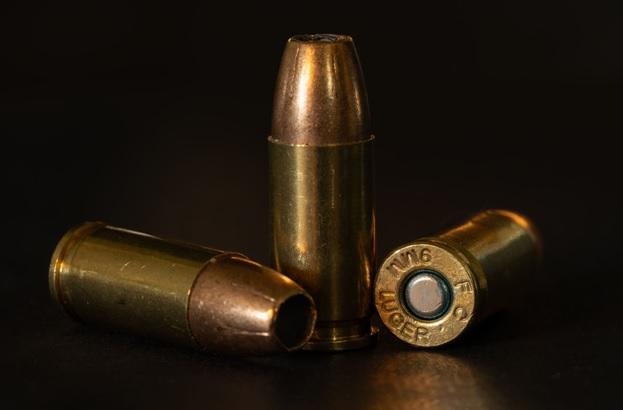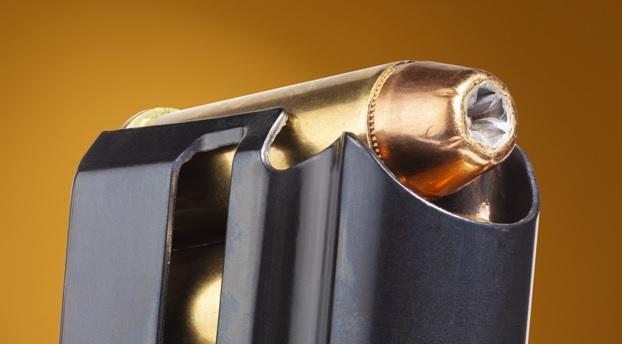If you’ve made the decision to carry a firearm for self-defense, there are a whole bunch of additional decisions you need to make.
What caliber do you want to carry? What model of firearm? Does a semi-auto or a revolver work best for you? How are you going to carry and, perhaps equally as importantly, will you carry open or concealed?
You need to carry in a way that is not only safe but responsible and practical for you. You also need to carry a gun that is reliable, accurate, and consistent, when you need it most. You will get no second chances if you ever need to draw.
None of these decisions is easy to make, and all of them are important, but there’s one we’ve left out which is often overlooked.
It’s the type of ammo to choose for defensive applications. This all too often is overlooked, and that is an issue we intend to rectify.
Ammunition, and bullet types, can be as different from each other as action types can be.
So, with that said, and considering the fact that all 9mm ammo boxes contain different rounds, how do you choose an ammo for defensive carry?
What an Effective Defensive Round Offers (That FMJ Ammo Does Not)

The purpose of an effective self-defense round is to stop a hostile threat as expediently as possible.
To do so, a self-defense round should offer both optimal disruption (also known as expansion) and penetration characteristics.
Two common types of ammo, FMJ ammo and LRN ammo, are both considered generally unsuitable for defensive carry.
First let’s look at LRN, or lead round nose ammo. Lead is a very soft metal, and even in powerful cartridges, like .45 ACP, lead deforms too rapidly on contact with a soft target to produce desirable penetration characteristics.
That is, even if a lead round nose bullet has effective stopping power, it is unlikely to penetrate effectively enough to stop a threat quickly.
On the other hand we have FMJ bullets, which are equally unsuitable for defensive applications, but for the opposite reason.
FMJ bullets, which are fully enclosed in a metal jacket, are designed to offer maximum penetration and stability. While this is excellent for target practice and accuracy, for defensive applications, it’s not ideal.
On contact with a soft target, FMJ bullets will penetrate too far and not dump their energy effectively. There is a serious risk of overpenetration (which presents a threat to other bystanders) and the bullet is liable to carry off much of its stopping power, rather than dumping that energy into the target.
Ammunition engineers have responded to these shortcomings by developing hollow point ammunition, the most effective types of which are known as JHP, or jacketed hollow point ammunition.
All else considered, jacketed hollow points are the best type of ammunition for defensive carry. Here’s why and what to look for.
What to Look for on a 9mm Ammo Box of Defensive Ammo
Unlike a lead round nose bullet or a jacketed bullet, hollow point ammo, which has a void in the nose, is intended to offer a decent balance between penetration and disruption in order to produce optimal energy transfer characteristics.
Whereas an FMJ bullet is designed to penetrate maximally, a jacketed hollow point bullet is designed to penetrate adequately to stop a threat but not to over-penetrate.
The jacket of the hollow point provides stability for the lead core, allowing for both optimal penetration and disruption as the bullet expands - provided the jacket is bonded.
Bonded hollow point bullets have a jacket that is mechanically attached to the core. Without bonding, the bullet runs the risk of having its jacket separate from the core during impact with a target, which will ruin both penetration and energy transfer.
In addition to looking for hollow point ammo with a bonded jacket, you should also look for one with a deeply skived jacket, like Federal HST ammo.
Skiving is like scoring along the margins of a jacket’s edge. These serve as weak points along which the jacket predictably tears away on impact with a soft target.
Skiving in a bullet’s jacket produces predictable, consistent disruption on contact with a soft target, resulting in optimal penetration and energy transfer characteristics designed to stop a hostile target as effectively as possible.
You’ll also want to look for an ammo that does not plug on contact with a soft target. Plugging refers to a phenomenon that occurs in which a soft target encounters a barrier between itself and the hostile target - such as clothing.
Plugging, as the name might suggest, obstructs the hollow in the bullet’s nose, causing it to react more like a jacketed bullet. This interferes with disruption and adversely affects the bullet’s performance.
One more thing you need to consider seriously is how the round performs in your gun. Remember that all guns are different and will not feed different ammos in the same manner. Some hollow points can jam on mag or chamber edges.
This makes it absolutely imperative that you practice with the defensive load you choose so you can be 100% sure you know how it will react in your gun. You don’t want to be dealing with stovepipe jams (or worse) if you ever have to draw your gun (God forbid).
So, as a final note, once you have chosen a suitable self-defense round like Speer Gold Dot or Federal HST or Hydra-Shok, make sure you train with it. This way you will know how it behaves and you can sight in your gun using the rounds you actually intend to carry for self defense.

No Two 9mm Ammo Boxes Are Quite Alike
Considering the fact that you have so much to consider in a self-defense ammo, don’t rush the decision. Take a look through the options out there, take to heart what we published in this post, and then make sure - most importantly - that you train with whatever you choose.
In other words, don’t train with FMJ ammo and then carry JHP ammo on the street. You need experience with what you carry and training is the only way to get it.
Otherwise, enjoy our competitive prices on a wide range of different defensive ammo, keep in mind that there are all different types of 9mm ammo boxes, and make sure you check our police trade-in and weekly specials before you buy.

